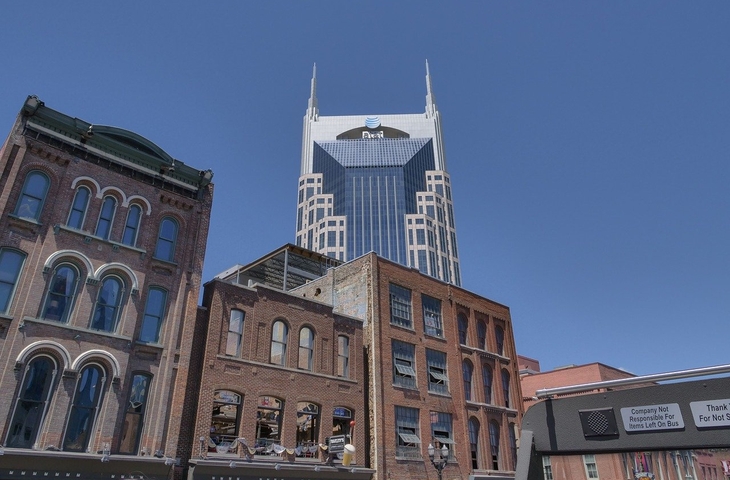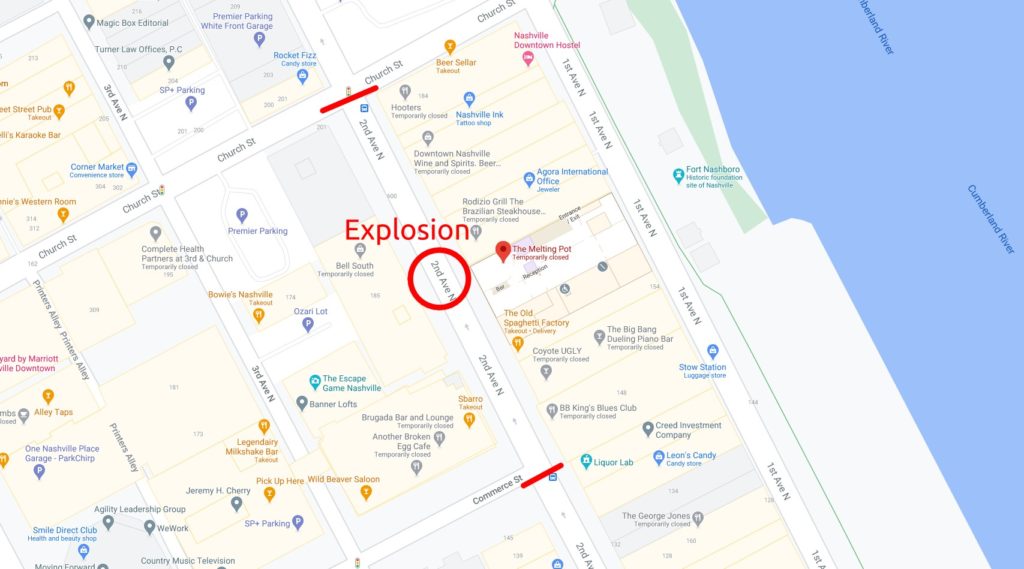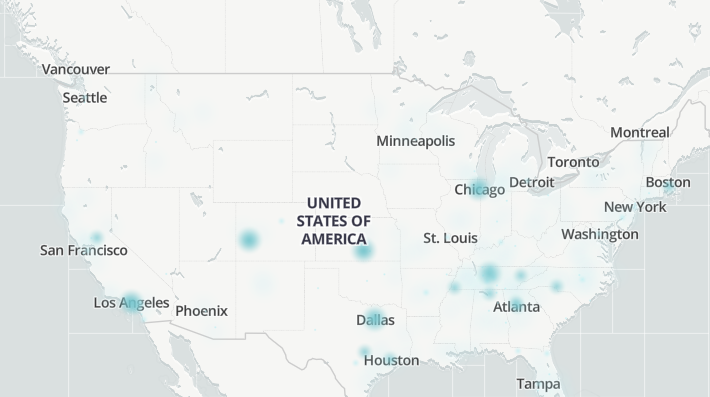On Christmas Morning, 63-year-old Anthony Warner parked an explosive-laden RV on the usually bustling Second Avenue in Nashville, Tennessee and detonated it. The target is believed to have been AT&T’s “Batman building.”
Because of Warner’s own copious warnings and the quick work of Nashville Metro police, there were thankfully no deaths other than Warner’s, and just a handful of injuries to bystanders. However, the bomb wrecked countless businesses, terrified Tennesseans, and created a days-long communication outage that demonstrated just how fragile our telecom system is.
We live within driving distance to Nashville, thankfully far away from the blast, but close enough that our favorite restaurant, Rodizio Grill, was destroyed and closed indefinitely (the company has set up a GoFundMe for its employees). In the days after, we and many of our friends suffered from communication outages and hiccups. Internet access and cellular service failed for many, even if they weren’t AT&T customers. 911 systems failed, ATMs stopped working, businesses couldn’t process credit cards, and flights were grounded at Nashville International Airport.
People are tempted to take a specific event and figure out how to prepare exactly for that event. But being a sane prepper means knowing that yes, every event is unique, but the things you should learn and do to prepare ahead of time are the same across situations.
Let’s take a look at the events leading up to and following the bombing and how they illustrate the importance of the prepping concepts taught on this site.
Key lessons:
- It’s difficult to know of an impending terrorist attack, but be aware of warning signs.
- Keep a go-bag packed and ready at all times, and be ready to leave your home at any hour.
- Once you evacuate a danger zone, don’t return until you can confirm it’s safe.
- Consider carrying a micro individual first aid kit with you at all times, with lifesaving essentials like a tourniquet and a pressure dressing.
- Our telecommunications system is fragile. Have backup communication sources like a landline phone, a Wi-Fi hotspot from a different carrier than your cell phone, an emergency radio receiver, and ham radios.
- Keep cash on hand in case ATMs and credit card systems are down.
- Have an emergency fund in case a disaster shuts down your place of employment.
- If you’re in Nashville and need help, or want to help those who do, here is a long list of relief efforts.
Potential signs leading up to the attack
- Potential terrorists sometimes throw red flags, and sometimes they don’t. Warner was friendly to neighbors, didn’t tout politics or religion, and other than a 1978 charge for marijuana possession, had a clean criminal record.
- However, Warner’s recent behavior did offer a few clues that something was off. He gave away many of his possessions, including his car and house, shortly before the attack and in a very unusual way. He told people that he had cancer and that he was retiring.
- Warner told a neighbor who asked about his Christmas plans that “Nashville and the world is never going to forget me.”
- As it turns out, Warner’s then-girlfriend told police in August 2019 that Warner was building a bomb in his RV. More than a year before the attack! Police attempted a check-the-box ‘investigation’, but gave up after they knocked on Warner’s door and he didn’t answer.
What should you do?
- If someone you know has a sudden, unexplained, and seemingly-dangerous change in behavior — such as giving away their major possessions and making comments about being famous — say something. It might be as simple as an email to your local police.
- This is often tricky. You don’t want to snitch or cry wolf and don’t want to hurt your relationship with the person. But you also don’t want to be the person who didn’t call.
First signs of trouble on the day of the explosion
- The first warning of the impending blast happened at 4:30 AM on Christmas morning. Betsy Williams, in her nearby home, woke to the sound of gunfire and called 911.
- After Williams called 911, the RV began playing a loud recorded warning telling anyone in earshot to evacuate because a bomb was about to go off.
- Williams took the warning seriously and fled to nearby Nissan Stadium.
- There was nothing else to indicate the parked RV was a danger to anyone. The broadcasted recordings were the only signal.
- There are parking spots along Second Avenue, so a vehicle parked there wasn’t terribly out of place.
- Because the bomb didn’t explode right away, Williams headed home, thinking it was a false alarm. She arrived just in time to see the blast.
https://www.youtube.com/watch?v=7JcaLjTvfVA
What should you do?
- Situational awareness is key. This was about the last place and time anyone around would’ve expected a terrorist attack. And the unusual recordings might have even seemed like a joke — “Nah, a real bomb wouldn’t warn people!” But trust your gut and pay attention to very unusual things, especially threats of violence. Better to look silly by leaving for a false alarm than end up dead.
- See something? Say something! Williams did the right thing by calling 911 when something felt reasonably wrong to her — she lived in the area, for example, and knew enough about what’s normal to feel when something was not normal.
- Williams gets even more points for listening to new information — the ‘this car will explode’ warning that came after the previous recordings and 911 call — and taking action by leaving her home. It was cold and early in the morning, but she did it anyway.
- Grab your bug out bag and leave quickly! Part of the point of a BOB is to be able to leave your home with only a moment’s notice. This is an example of why.
- Because the threat was for a bomb, you’d want to avoid being in direct line-of-sight with the area in case shrapnel starts flying. Put ‘shields’ like buildings between you and the threat ASAP.
- Know multiple ways to leave your home / neighborhood. Even if that saves a few seconds of wondering “uhh where should I go,” it could make the difference.
- Be patient and get more info before assuming things are safe. Williams could’ve waited just a little longer before returning and/or used a radio, cell phone, etc. to help make a smarter decision. It would also be a great time to monitor a police scanner if that’s an option in your area. If you don’t have a scanner, Broadcastify might have an online stream of emergency channels in your area.
The blast
- The explosion happened at 6:30 AM, at 166 Second Avenue, in front of The Melting Pot and Rodizio Grill restaurants.
- Law enforcement has yet to specify the construction of the bomb, but the explosive was possibly ammonium nitrate, a powerful chemical fertilizer that is often used in bombs, such as the one used in the 1995 Oklahoma City bombing. It also reportedly caused the recent explosion in Beirut. The telltale sign is the reddish-brown smoke you see in the video of the Nashville incident.
- The blast was tremendous and felt for miles away.
What should you do?
- There are three reasons why you would have still been in the blast area: You understood it was a bomb threat but couldn’t leave in time, you knew it was a threat but ignored it, or you had no idea a threat was near.
- If you knew there was a bomb threat but couldn’t get clear of the area in time, your goal would be to create distance + put shields between you and the blast. That might mean ducking into a building or behind a car, laying flat on the ground, etc. Anything to get you out of the path of the imminent blast.
- If you were oblivious to what was happening, there isn’t anything realistic you can do in the split seconds of the explosion.
Immediate aftermath
PHOTOS: CBS affiliate @NC5 captures aerial view over scene of Christmas morning explosion in Nashville, which authorities believe to be an "intentional act" https://t.co/sP9YfbM8vb pic.twitter.com/MCII7b2U4Q
— CBS News (@CBSNews) December 25, 2020
- Eight people were injured. All were treated and released.
- The blast damaged at least 41 businesses up and down Second Avenue, as well as buildings on nearby streets.
- Glass shattered for hundreds of yards.
- At least three vehicles burned.
Rough diagram of where the bomb was detonated and how far it reached.
What should you do if you were in the blast area but not hurt?
- Situational awareness: Is the area safe? You might look for things on fire, damaged buildings, things overhead that might fall on you, and so on. Don’t just assume “okay, blast over, things are safe now.”
- Unfortunately, some terrorist bombings use multiple explosions, and they might not all go off at the same time. There’s nothing you would’ve known at this time to tell you if there were one or more bombs.
- So unless you’re injured or helping someone else, you should leave and wait at a safe distance to talk with police afterward — even if you don’t think you know anything important, you might, so be a good witness. Big cases are often solved with one random detail from a bystander.
- Has anyone called 911?
What should you do if other people are hurt?
- Although things are moving quickly, you still want to be aware of remaining dangers in the area so you can make a smarter decision about whether to flee or help others. Adding more casualties to the pile makes this harder than they need to be.
- If you’re not prioritizing loved ones, and there are multiple injured people around, try to get a quick feel for who’s in the worst shape. A screaming child with a skinned knee doesn’t need your help as much as the quiet person who lost a limb and is bleeding out.
- If you carry an individual first aid kit, the most likely thing you would need to rush and use first is a tourniquet. That’s because loss of limbs or other serious hemorrhaging is a common injury after an explosion, and you might need to self-apply a tourniquet to stop yourself from bleeding out before help arrives.
- Pressure dressings help with bleeding not appropriate for a tourniquet. You might also use a chest seal if shrapnel punctured someone’s lungs.
- Do you know how to use that gear? You don’t want to figure it out for the first time in that moment. Learn how to stop most bleeding and how to use a tourniquet.
- Because this is a localized event in an urban area, you can safely assume help will be there soon. So you won’t be dealing with anything that comes after, such as dressing wounds. Your job is to keep people alive and hopefully stable until help arrives.
What should you do if you’re hurt?
- Yell or do what you can to draw attention without making things worse.
- If you’re seriously injured and don’t need to move, don’t! You can make injuries worse. Sit or lay down.
- If you’re injured enough to not move around a lot, but can still safely move some, try to scootch your way behind cover in case there are more blasts.
- You might need to help yourself even if there are other people trying to help you — after all, most people are woefully unprepared and have no idea what to do. For example, there have been bombing victims who self-applied a tourniquet to a limb that was blown off. Hard to imagine what they were experiencing in that moment, but they still had the fortitude to save their own life.
Consequences
- There was an AT&T service outage throughout the United States, primarily in Middle Tennessee, which included landline telephones, cellular networks, the U-Verse TV service, and broadband internet.
- Cellular service was also spotty on other carriers, including Sprint, T-Mobile, and Verizon.
- 911 services were also disrupted in many areas.
- Credit card systems across the region were knocked offline.
- Many ATMs were nonfunctional.
- The Memphis Air Route Traffic Control Center experienced communications issues, leading to flights from Nashville International Airport to be briefly grounded.
- Numerous downtown Nashville employees are out of work, at least temporarily.
- Dozens of people who lived in the affected area are now suddenly homeless for a long stretch of time, living in a hotel or with loved ones with whatever possessions they had on them at the time.
Heatmap of communication outages from the Nashville AT&T building outage
What should you do?
- Recognize that our telecommunications systems are much more fragile than people think.
- Have off-grid methods of gathering information, like a quality emergency radio.
- In extreme situations, ham radio can be invaluable, but it won’t help much if you want to order a pizza.
- It’s getting harder to justify having a landline phone (even if just for backup purposes) but when Verizon’s cellular service failed us, our landline still worked and we were able to order food. In our case, having the land line available is only a few extra dollars a month, so we keep it around for this kind of situation.
- Consider buying a cellular hotspot from a different carrier than your cell phone. If one network loses service, you may still be able to maintain connectivity.
- Keep a good amount of cash on hand. You never know when ATMs and credit card systems could fail.
- Don’t forget to build up and maintain an emergency fund. You never know when your place of business could literally vanish overnight.
- This is yet another example of why go-bags are critical. Even if someone’s nearby apartment wasn’t destroyed in the blast, they still had to evacuate quickly after the blast and don’t know when they can return. Having bags packed and ready to grab could make a huge difference in how easy the next weeks/months go living in hotels and trying to get life back on track. Imagine trying to rebuild your life after your condo exploded, but without any record of your important account numbers or insurance, for example.



You are reporting the comment """ by on